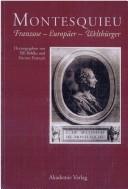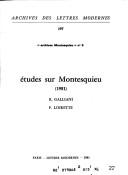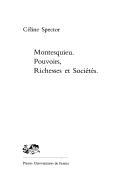| Listing 1 - 10 of 39 | << page >> |
Sort by
|

ISBN: 305004165X 3050084979 Year: 2014 Publisher: Berlin : Akademie Verlag,
Abstract | Keywords | Export | Availability | Bookmark
 Loading...
Loading...Choose an application
- Reference Manager
- EndNote
- RefWorks (Direct export to RefWorks)
Anläßlich des 250. Todestags des Baron de La Brède et de Montesquieu veranstaltete die Berlin-Brandenburgische Akademie der Wissenschaften ein Symposion, das auf die Aktualität seines Oeuvres abzielte. Namhafte französische und deutsche Sozial- und GeisteswissenschaftlerInnen diskutierten Potenzen und Grenzen des Operierens mit den Ideen dieses "philosophe" des 18. Jahrhunderts. Montesquieus Vorstellungen von der Teilung der Gewalten, vom Imperium, vom Verhältnis von Individuum und Gemeinschaft, seine Überzeugung von der Bedingtheit sozialer durch natürliche Phänomene oder die Annahme einer notwendigen Relation zwischen politischen Institutionen und der Kultur einer Gesellschaft wurden analysiert unter der Perspektive, wie sich damit Fragen beantworten lassen, vor denen die modernen Gesellschaften heute stehen. Einen besonderen Schwerpunkt bildeten die "Lettres persanes". Ging es zum einen um die Modellwirkung von Montesquieus Bestseller für das Genre des Brief- und Reiseromans, so verfaßten Berliner und Pariser Schüler "Lettres Berlinoises sur la France", in denen sie wechselseitige Vorurteile von Deutschen und Franzosen erörterten. Ergänzt wird der Band durch Dokumente, die Montesquieus Beziehungen zur Académie Royale des Sciences et Belles-Lettres bezeugen, wie z.B. sein Briefwechsel mit dem Akademiepräsidenten Maupertuis oder auch dessen Gedenkrede auf Montesquieu. Beigefügt ist dem Band eine neue deutsche Übersetzung der für die Imperien-Thematik zentralen "Réflexions sur la monarchie universelle en Europe".
Philosophy --- History. --- Montesquieu, Charles de Secondat, --- Mengdesijiu, --- Mongtētkiʻǣ, --- Monteskʹe, Sharlʹ Lui, --- Monteskīĭ, --- Monteskiusz, --- Monteskiyü, --- Monṭesḳyeh, --- Montesquieu, --- Montesquieu, Charles Louis de Secondat, --- Montesquiou, --- Montesukyū, --- Muntisikyū, --- Secondat, Charles-Louis de, --- מונטסקייה --- モンテスキウ̄, --- 孟德斯鳩,
Book
ISBN: 0791477436 1435695518 9781435695511 9780791477434 0791476219 9780791476215 Year: 2009 Publisher: Albany SUNY Press
Abstract | Keywords | Export | Availability | Bookmark
 Loading...
Loading...Choose an application
- Reference Manager
- EndNote
- RefWorks (Direct export to RefWorks)
Montesquieu (1689–1755) is regarded as one of the most important thinkers of the Enlightenment. His Lettres persanes and L'Esprit des lois have been read by students and scholars throughout the last two centuries. While many have associated Montesquieu with the doctrine of the "separation of powers" in the history of ideas, Rebecca E. Kingston brings together leading international scholars who for the first time present a systematic treatment and discussion of the significance of his ideas more generally for the development of Western political theory and institutions. In particular, Montesquieu and His Legacy supplements the conventional focus on the institutional teachings of Montesquieu with attention to the theme of morals and manners. The contributors provide commentary on the broad legacy of Montesquieu's thought in past times as well as for the contemporary era.
Political science --- Political philosophy --- Philosophy. --- Montesquieu, Charles de Secondat, --- Mengdesijiu, --- Mongtētkiʻǣ, --- Monteskʹe, Sharlʹ Lui, --- Monteskīĭ, --- Monteskiusz, --- Monteskiyü, --- Monṭesḳyeh, --- Montesquieu, --- Montesquieu, Charles Louis de Secondat, --- Montesquiou, --- Montesukyū, --- Muntisikyū, --- Secondat, Charles-Louis de, --- מונטסקייה --- モンテスキウ̄, --- 孟德斯鳩,
Book
ISBN: 1108573819 1108552692 1108617271 1108428177 1108450237 Year: 2018 Publisher: Cambridge : Cambridge University Press,
Abstract | Keywords | Export | Availability | Bookmark
 Loading...
Loading...Choose an application
- Reference Manager
- EndNote
- RefWorks (Direct export to RefWorks)
Dubbed 'the oracle' by no less an authority than James Madison, Montesquieu stands as a theoretical founder of the liberal political tradition. But equally central to his project was his account of the relationship of law to each nation's particular customs and place, a teaching that militates against universal political solutions. This teaching has sometimes been thought to stand in tension with his liberal constitutionalism. In this book, Keegan Callanan argues that Montesquieu's political particularism and liberalism are complementary and mutually reinforcing parts of a coherent whole. In developing this argument, Callanan considers Montesquieu's regime pluralism, psychological conception of liberty, approach to political reform, and account of 'the customs of a free people', including the complex interaction of religion and commerce. Callanan concludes that, by re-orienting our understanding of liberalism and redirecting our attention toward liberty's distinctive preconditions, a return to Montesquieu's political philosophy leaves us better prepared to confront liberal democracy's contested claim to universality.
Liberalism --- Political culture --- Culture --- Political science --- Philosophy. --- Montesquieu, Charles de Secondat, --- Mengdesijiu, --- Mongtētkiʻǣ, --- Monteskʹe, Sharlʹ Lui, --- Monteskīĭ, --- Monteskiusz, --- Monteskiyü, --- Monṭesḳyeh, --- Montesquieu, --- Montesquieu, Charles Louis de Secondat, --- Montesquiou, --- Montesukyū, --- Muntisikyū, --- Secondat, Charles-Louis de, --- מונטסקייה --- モンテスキウ̄, --- 孟德斯鳩,
Book
ISBN: 9780300141252 0300141254 Year: 2009 Publisher: New Haven, Conn. Yale University Press
Abstract | Keywords | Export | Availability | Bookmark
 Loading...
Loading...Choose an application
- Reference Manager
- EndNote
- RefWorks (Direct export to RefWorks)
This fresh examination of the world of Montesquieu seeks to understand the short-comings of modern democracy in light of the French philosopher's insightful critique of commercial republicanism.
Montesquieu, de, Charles-Louis de Secondat --- Liberty. --- Liberté --- Montesquieu, Charles de Secondat, --- Civil liberty --- Emancipation --- Freedom --- Liberation --- Personal liberty --- Democracy --- Natural law --- Political science --- Equality --- Libertarianism --- Social control --- Mengdesijiu, --- Mongtētkiʻǣ, --- Monteskʹe, Sharlʹ Lui, --- Monteskīĭ, --- Monteskiusz, --- Monteskiyü, --- Monṭesḳyeh, --- Montesquieu, --- Montesquieu, Charles Louis de Secondat, --- Montesquiou, --- Montesukyū, --- Muntisikyū, --- Secondat, Charles-Louis de, --- מונטסקייה --- モンテスキウ̄, --- 孟德斯鳩, --- Montesquieu --- Liberté --- Liberty
Book
ISBN: 2256903494 9782256903496 Year: 1975 Volume: 158 6 Publisher: Paris
Abstract | Keywords | Export | Availability | Bookmark
 Loading...
Loading...Choose an application
- Reference Manager
- EndNote
- RefWorks (Direct export to RefWorks)
Montesquieu, de, Charles-Louis de Secondat --- Montesquieu, Charles de Secondat, --- Montesquieu, Charles de Secondat baron de --- -Contributions in political science --- Montesquieu --- Mengdesijiu, --- Mongtētkiʻǣ, --- Monteskʹe, Sharlʹ Lui, --- Monteskīĭ, --- Monteskiusz, --- Monteskiyü, --- Monṭesḳyeh, --- Montesquieu, --- Montesquieu, Charles Louis de Secondat, --- Montesquiou, --- Montesukyū, --- Muntisikyū, --- Secondat, Charles-Louis de, --- מונטסקייה --- モンテスキウ̄, --- 孟德斯鳩, --- Montesquieu, Charles de Secondat, - baron de, - 1689-1755

Abstract | Keywords | Export | Availability | Bookmark
 Loading...
Loading...Choose an application
- Reference Manager
- EndNote
- RefWorks (Direct export to RefWorks)
Montesquieu, de, Charles-Louis de Secondat --- Voltaire --- Richelieu, de, Armand Jean Duplessis --- Montesquieu --- Montesquieu, Charles de Secondat, --- Mengdesijiu, --- Mongtētkiʻǣ, --- Monteskʹe, Sharlʹ Lui, --- Monteskīĭ, --- Monteskiusz, --- Monteskiyü, --- Monṭesḳyeh, --- Montesquieu, --- Montesquieu, Charles Louis de Secondat, --- Montesquiou, --- Montesukyū, --- Muntisikyū, --- Secondat, Charles-Louis de, --- מונטסקייה --- モンテスキウ̄, --- 孟德斯鳩, --- Criticism and interpretation.

ISSN: 12428124 ISBN: 2130529356 9782130529354 Year: 2004 Publisher: Paris: Presses Universitaires de France,
Abstract | Keywords | Export | Availability | Bookmark
 Loading...
Loading...Choose an application
- Reference Manager
- EndNote
- RefWorks (Direct export to RefWorks)
Political science --- Philosophy, French --- Science politique --- Philosophie française --- History --- Philosophy --- Histoire --- Philosophie --- Montesquieu, Charles de Secondat, --- #A0509HI --- Philosophie française --- Mengdesijiu, --- Mongtētkiʻǣ, --- Monteskʹe, Sharlʹ Lui, --- Monteskīĭ, --- Monteskiusz, --- Monteskiyü, --- Monṭesḳyeh, --- Montesquieu, --- Montesquieu, Charles Louis de Secondat, --- Montesquiou, --- Montesukyū, --- Muntisikyū, --- Secondat, Charles-Louis de, --- מונטסקייה --- モンテスキウ̄, --- 孟德斯鳩, --- Political and social views. --- France --- Politics and government
Book
ISBN: 9782262023799 Year: 2007 Publisher: Paris : Librairie Académique Perrin,
Abstract | Keywords | Export | Availability | Bookmark
 Loading...
Loading...Choose an application
- Reference Manager
- EndNote
- RefWorks (Direct export to RefWorks)
Political science --- Science politique --- History --- Histoire --- Montesquieu, Charles de Secondat, --- Political and social views. --- France --- Politics and government --- Politique et gouvernement --- Mengdesijiu, --- Mongtētkiʻǣ, --- Monteskʹe, Sharlʹ Lui, --- Monteskīĭ, --- Monteskiusz, --- Monteskiyü, --- Monṭesḳyeh, --- Montesquieu, --- Montesquieu, Charles Louis de Secondat, --- Montesquiou, --- Montesukyū, --- Muntisikyū, --- Secondat, Charles-Louis de, --- מונטסקייה --- モンテスキウ̄, --- 孟德斯鳩, --- Idées politiques --- 18e siècle --- Vie intellectuelle --- 1589-1789
Book
ISBN: 8820722941 2740000111 0729404625 9788820722944 Year: 1993 Volume: 1 Publisher: Napoli Liguori
Abstract | Keywords | Export | Availability | Bookmark
 Loading...
Loading...Choose an application
- Reference Manager
- EndNote
- RefWorks (Direct export to RefWorks)
Montesquieu, Charles de Secondat, --- Criticism and interpretation --- Congresses --- Mengdesijiu, --- Mongtētkiʻǣ, --- Monteskʹe, Sharlʹ Lui, --- Monteskīĭ, --- Monteskiusz, --- Monteskiyü, --- Monṭesḳyeh, --- Montesquieu, --- Montesquieu, Charles Louis de Secondat, --- Montesquiou, --- Montesukyū, --- Muntisikyū, --- Secondat, Charles-Louis de, --- מונטסקייה --- モンテスキウ̄, --- 孟德斯鳩, --- Congresses. --- Montesquieu, Charles de Secondat, - baron de, - 1689-1755 - Criticism and interpretation - Congresses --- Montesquieu, Charles de Secondat, - baron de, - 1689-1755
Book
ISBN: 0192654225 0191925403 0192654233 Year: 2021 Publisher: Oxford, England : Oxford University Pres,
Abstract | Keywords | Export | Availability | Bookmark
 Loading...
Loading...Choose an application
- Reference Manager
- EndNote
- RefWorks (Direct export to RefWorks)
This book develops a new theoretical framework for studying the corruption, disintegration, and renewal of democracy: what it is, how it begins, and where in society it plays out. Näsström argues that modern democracy is a sui generis political form animated and sustained by a spirit of emancipation.
Democracy. --- Self-government --- Political science --- Equality --- Representative government and representation --- Republics --- Montesquieu, Charles de Secondat, --- Criticism and interpretation. --- Mengdesijiu, --- Monteskʹe, Sharlʹ Lui, --- Monteskiusz, --- Muntisikyū, --- Montesquieu, Charles Louis de Secondat, --- Montesquieu, --- Monteskīĭ, --- Mongtētkiʻǣ, --- Montesquiou, --- Monṭesḳyeh, --- Monteskiyü, --- Secondat, Charles-Louis de, --- Montesukyū, --- מונטסקייה --- モンテスキウ̄, --- 孟德斯鳩,
| Listing 1 - 10 of 39 | << page >> |
Sort by
|

 Search
Search Feedback
Feedback About UniCat
About UniCat  Help
Help News
News